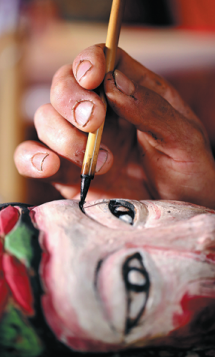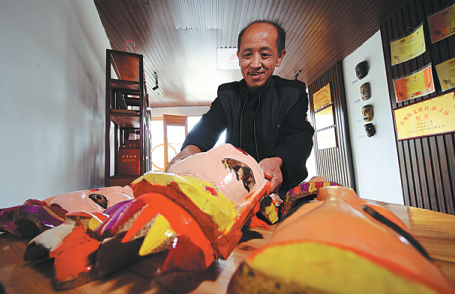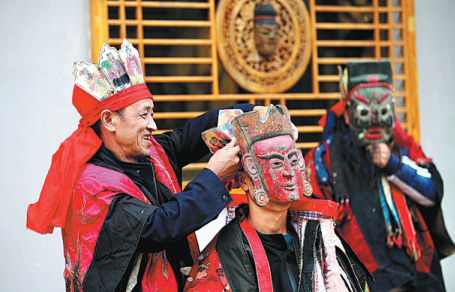Ancient Nuo Opera regains former glory in Guizhou
Inheritor worked for 30 years to ensure revival and modernization of folk art

A 56-year-old man in Southwest China's Guizhou province has worked to preserve and modernize Nuo Opera for more than 30 years and has also managed to pass the tradition on to others.
An ancient folk drama based on nuo, a form of folk religion, Nuo Opera performers wear masks and dance to ward off evil spirits. It is a recognized national intangible cultural heritage and is popular in many parts of the country.
Born in a Nuo Opera family in Kaikong village, Cengong county, Guizhou, in 1965, Xiao Guanghua started to learn from his father when he was 12. After 10 years of assiduous study, he became the 14th inheritor in his family of the Sizhou Nuo Opera tradition.
Cengong, which was called Sizhou in ancient times, boasts a long history of nuo culture, which dates back to as early as the Eastern Han Dynasty (25-220). Different from many other forms of opera, it features unique styles of singing combined with acrobatic performances with evocative names such as "climbing stairs of swords", "plunging into a sea of flames", "biting a red-hot iron" and "swallowing bamboo chopsticks". It was listed as a form of provincial intangible cultural heritage in 2005.
As a local nuo master in the 1990s, Xiao formed a troupe of eight and began to tour the countryside.
In 1992, the troupe performed in Beijing and became an overnight success. A year later, it was invited to perform in Japan, after Japanese scholars visited Xiao and dubbed Nuo Opera "the mystery of the East" and "the living fossil of modern drama".
Although the troupe was later disbanded because it wasn't earning enough money for members to make a living, Xiao didn't give up on his dream to protect and pass on the tradition to the next generation of performers.
In 2007, he set up a performance center and established a new troupe.
The pioneering folk artist also broke with tradition by recruiting female apprentices. "I'll pass it on to whoever wants to learn, whether they're men or women," he said. To date, there have been 45 troupe members, 15 of them women.
Now the troupe makes between 400,000 to 600,000 yuan ($62,760 to $94,140) a year, and members receive a monthly salary of between 6,000 and 8,000 yuan.
In 2016, Xiao's 25-year-old son Xiao Jianghe became the 15th inheritor of Sizhou Nuo Opera.
Xiao said that over the years, he has been approached by people from nearby townships and counties asking him for lessons.
Thanks to his troupe's lead, there are more than 100 nuo altars for performances, 500 nuo folk artists and nearly 100 Nuo Opera bands in Cengong.
"After generations of innovation, Nuo Opera is no longer seen as a form of superstition. It is a unique form of folk culture that I long to bring to a wider audience," Xiao said.
For over 30 years, Xiao and his troupe have put on thousands of performances, over 100 of which were staged abroad, including in Japan, South Korea, Singapore and Australia.
He also came up with the idea of developing cultural tourism in his township, and in 2016, Kaikong village was listed in the second national batch of traditional Chinese villages. Last June, Xiao set up the Sizhou Nuo Opera Conservatory in his newly built house. It contains a small museum with several exhibition rooms on the first floor, where precious old masks, costumes, opera scores and other props are on display.
His troupe now serves an important role in promoting cultural tourism in the area.
To make the folk culture known at home and abroad, Xiao has been working on a study about its preservation. His book, Introduction to Sanqing Nuo Culture, is about to be finished.
"As a form of ancient culture, Sizhou Nuo Opera belongs to the nation and the world. It's great to see it regain the shine of its former glory," he said.
Wang Jin contributed to this story.




Today's Top News
- Takaichi officially reelected as Japan PM at Diet
- Xi sends Chinese New Year card in return to friends in US state of Iowa
- Japanese PM Takaichi's cabinet resigns
- Iran not to abandon peaceful nuclear technology
- 2nd round of Iran-US talks held in 'constructive' atmosphere, new talks to be scheduled: Iran's FM
- The Year of the Horse: A new gallop for the Spring Festival Gala






























